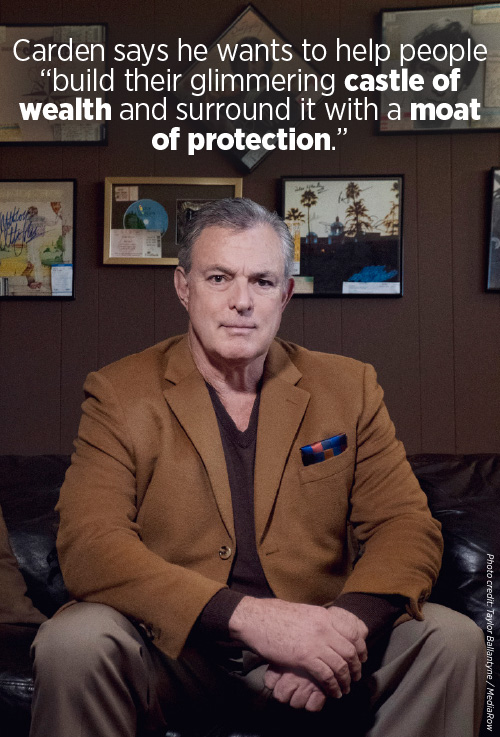Protector of the Castle — With Brian Carden

Brian Carden was fresh out of college, working in a department store, when a flyer on his apartment door set him on a completely different path.
The flyer was from a recruiter who was looking for people interested in launching an insurance career with John Alden Life. Carden contacted the recruiter and embarked on an insurance and financial services journey that has lasted 40 years.
Carden is based in Brentwood, Tenn., and is an advisor affiliated with Madison Avenue Securities. He said he views his career as a calling to serve and views himself as a “professional explainer.” He also is an avid blogger, writing about “things that make you go hmmm,” and he published a book, “Castles & Moats,” in 2022.
But his early days in the insurance business were mainly spent on the telephone. “I was making a minimum of 40 connected calls a day to insurance agents to market my one-to-15-employee small group health plan,” he recalled.
He eventually moved on to Safeco Insurance, where he learned about annuities and 401(k) plans. He moved into the retail side of the business, where he traveled throughout an eight-state territory.
“Safeco also had a huge network of property and casualty agencies,” he recalled. “I called on them and asked them who else I should talk to.”
At that time, the Internal Revenue Code Section 72(t) began allowing penalty-
free early withdrawals from 401(k) plans and individual retirement accounts under certain circumstances. This enabled people to retire prior to reaching age 59½ while avoiding a 10% penalty on their retirement plan withdrawals. Carden said Safeco was one of the early adopters of the 72(t) plan, and he spent much of his time explaining it to workers in large manufacturing facilities in his territory.
“I spent nights in North Carolina in the furniture factories. I did workshops with companies like R.J. Reynolds. At that time, North Carolina was flush with big manufacturing plants that needed to get people off their staff. And they offered that early retirement program. So I was the guy from out of town who came in and led the workshop for the advisors.”
Carden eventually became tired of the road, and someone he met through his local professional association asked him whether he would consider opening his own agency. He opened a Nationwide agency in the Nashville area, and his business took off.
“I jumped at it. I was good at it. I enjoyed it. And I learned how to ask good questions,” he said.
Carden said a friend gave him some advice that stuck with him. “He said, ‘Don’t waste your time calling on people; call on people who will refer you people.’” He focused on serving people who were buying homes in his community, and he called on real estate agents, lenders and attorneys for referrals.

Learning to sell
But after a while, Carden believed he already had done as much as he could do with his agency, so he sought another change.
A bank hired him to be a small-business 401(k) specialist, but a general agent for what was then known as Connecticut Mutual approached him about coming to work for him. It was a turning point in Carden’s career.
“When I was a wholesaler, I was the master of ‘show up and throw up,’” he recalled. “You know, ‘Here’s my product, here’s why it beats the competition. Here are the features and benefits. Here’s the commission. I’d love to work with you.’ And that was pretty much it.
“Now I am sitting down with my peers, my friends here at home, and that mentality didn’t work at all. And I started to fail miserably.”
Carden said a friend in the agency introduced him to the Sandler Selling System, which is a seven-step consultative selling approach. The goal is to establish an open dialogue to build trust and understand the prospect’s pain points, budget and decision-making process. Then, the seller can either disqualify the buyer or guide them to the right solution.
“I dug in until I mastered it, and I still use it today,” he said. “It taught me how to conduct an interview, how to get answers, how to find out if the person I’m talking to is the decision maker, how to set expectations and how to lead people to where they say, ‘I want to work with you.’”
A vacation leads to an opportunity
Opportunities can crop up in the most unlikely places, as Carden discovered when he was part of a group touring Greece on vacation. He met a woman in the group who had spent about 20 years working for some of the major securities firms in the U.S. She told Carden she dreamed of opening a boutique firm, and Carden told her he was thinking about opening his own practice.
A few months after returning to the U.S., the two reconnected and decided to move forward with their professional dreams. “She is the securities brains of the operation, and I am more on the insurance side,” he said.
The practice continues to grow, with Carden affiliating with a Medicare practice in an effort to serve another set of client needs.
Carden said the most difficult part of being independent is “motivating yourself to stay disciplined to go and see people.”
But being independent has many advantages as well.
“I love the fact that I am very agnostic when it comes to product. I work with a lot of BGAs and FMOs in different areas. And if I get, for example, someone who is a business owner, and he needs a large amount of life insurance for a business loan. And let’s say he has some health issues. I can pick up the phone, call my BGA and say, ‘This is who I have. What will be the best fit?’ And I let them do the due diligence, and I present their recommendation to the prospect.”
Writing from the heart
Carden wrote his first blog post about 20 years ago, and the subject was his father.
“Mom let him read it, and he called me and said, ‘Son, I appreciate you writing about me. But is that going to get you any business?’ That’s just the way he thought about it.”
Carden said that as he traveled to conferences or attended workshops or wholesalers meetings, he would be hit by what he called “an aha moment.”
“I thought, ‘I can spin that,’” he said. “And so that’s how the blog got started.”
He originally penned his thoughts for a local newspaper. It was in the days before Facebook and other social media became prime means of communication.
“I would find things that appealed to me, things that I think are taught incorrectly, like the whole ‘buy term, invest the difference’ mentality. Or when you see these auto insurance ads on TV that are basically pushing price and telling you you should only buy what you need. And I’m saying, ‘No, I walked away from a head-on collision. Let me tell you what you need.’”
Carden’s favorite blog topics relate to his family and personal experiences. He writes about the people in his life, about his favorite sports teams and his favorite activities — golf being a big one. And he ties those topics to some aspect of planning for the future.
Some of his personal experiences tie into the insurance world.
When he was about a week away from his 50th birthday, he was in a head-on collision that destroyed his car but left him unhurt. “I could have been a quadriplegic,” he said. Carden said he sometimes shows photos of his wrecked car to prospects and gets them thinking about whether they have planned sufficiently in case the unexpected happens to them.
He also tells stories of the time his family was sued because of a freak backyard fireworks accident, or the time his aunt and uncle and their children were killed in a plane crash. That makes people think about possibility of liability or the importance of contingent beneficiaries.
“I think it’s important that other people understand my life experiences. Because I don’t want them to go through that,” he said.
Carden tied together his thoughts from his blog posts and other writing, along with his industry knowledge, to publish the book “Castles & Moats.” The idea for the title came from his days in property/casualty insurance. Your home is your “castle,” and insurance is the “moat” that protects your castle.
In the same fashion, he said, someone’s wealth also can be their castle. He wants to help people “build their glimmering castle of wealth and surround it with a moat of protection.”
Carden said he not only is the book’s author, but also its “explainer.” He aims to help consumers understand, prioritize, organize, strategize and stress-test each financial product or strategy to help create a more favorable outcome.
His writing is another way for him to connect with clients, he said. “People recognize that I’m here, but I have a heart. And family is important to who I am.”
Securities and Advisory services offered through Madison Avenue Securities, LLC. Member FINRA/SIPC, a registered investment advisor.





States maintain iron grip on insurance regulation
A Rising Tide
Advisor News
- Beyond Finance: How an inclusive approach builds client trust
- Study asks if annuities help financial advisors build client relationships
- California’s big pension funds lost billions in stock market selloff. Can they recover in time?
- Economist: Tariffs could dampen GDP growth; raise unemployment, inflation
- Medium tenure for workers remains at about 5 years
More Advisor NewsAnnuity News
- Michal Wilson "Mike" Perrine
- Emerging digital annuity sales process cutting cycle times by 94%, IRI says
- In times of market volatility, FIAs make the difference
- Charitable gift annuities gaining in popularity
- Nationwide and Annexus establish first actively managed mutual fund within a RILA
More Annuity NewsHealth/Employee Benefits News
- CommunityCare names Josiah Sutton new president and CEO
- Strengthening Roots, Shaping the Future: Josiah Sutton Appointed CEO of CommunityCare
- Artificial intelligence was hot topic at Kentucky Chamber’s inaugural Healthcare Innovation Summit
- Cancer coverage for firefighters clears Senate
- New lawsuit challenges Connecticut Medicaid eligibility rules
More Health/Employee Benefits NewsLife Insurance News
- Michal Wilson "Mike" Perrine
- Proxy Statement (Form DEF 14A)
- AM Best Affirms Credit Ratings of Subsidiaries of Old Republic International Corporation; Upgrades Credit Ratings of Old Republic Life Insurance Company
- Proxy Statement (Form DEF 14A)
- Proxy Statement (Form DEF 14A)
More Life Insurance News